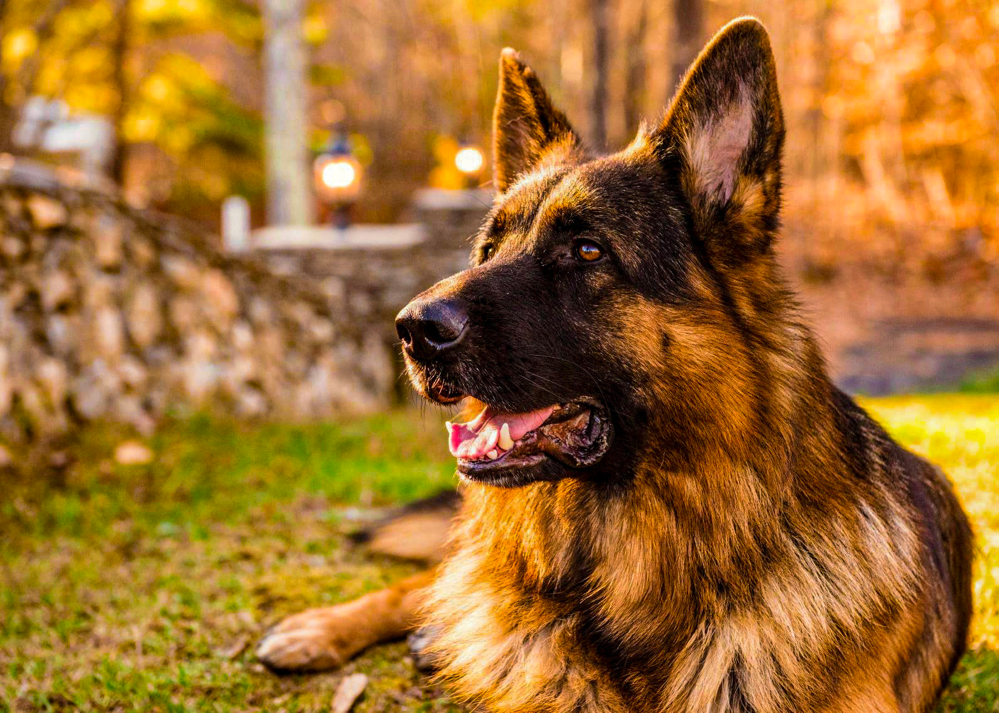Contents
- 1. Biting and Nipping
- 2. Barking/Howling
- 3. Signs of aggression
- 4. Fear of fireworks and thunderstorms
- 5. Destructive Chewing
- 6. Unresponsive dogs
- 7. Fear of traveling in cars
- 8. Digging
- 9. Shy and nervous
- 10. Separation Anxiety
- 11. Pulling on a leash
- 12. The habit of jumping up
- 13. Poop-eating
- 14. Hyperactivity
Your German Shepherd is more than just your best friend; you have to show parental abilities as well, to make sure that your puppy is being brought up with care, affection, and attention. As a pet owner, it is important to be aware of the major behavioral problems that your dog may show, in order to find the best solution for the same. The emotions and warmth attached to the process of bringing up a pup to a healthy and happy dog have got to do more with practical responsibilities and acts of care and love. This is not possible without knowing the basic behavioral problems that your dog may exhibit, as these are the symptoms of an unsociable, unhappy, lonely, nervous, and emotionally unstable dog, and being an owner, it is your duty to get your dog rid of these antagonisms. Let us assess these problems one by one.

1. Biting and Nipping
Often small pups and growing dogs are found biting and nipping. This behavior is mainly noticed in teething puppies and is sometimes found in dogs that are seeking attention or are annoyed with their way of living. It is important not to become out-rightly harsh or rude with your puppy for this reason. Rather you should seek expert guidance about dealing with this tendency.
2. Barking/Howling
Barking is the first attribute of being a dog but it is important to know the reason behind your dog’s frequent barking or howling. As a pet owner, you should make sure that your does not bark for unsocial reasons like being unfriendly towards guests, visitors, and strangers, out of fear or possessiveness, way to defend their territory, out of anxiety, nervousness, and frustration. In case it does, train and treat it well to make him lead a normal life.
3. Signs of aggression
Aggression is a common thing with larger breeds and they must be treated tactfully and with balanced discipline and patience. Make sure to analyze his psychological or seasonal issues like mating, breeding, etc. It is advisable not to use punishments or rude corrections. It is also important to deal with the dog’s inner conflicts and teach him calm and peace with things upsetting him.
4. Fear of fireworks and thunderstorms
It is a common tendency for dogs to get frightened by thunderstorms and fireworks or heavy metallic sounds. Under these situations, it may drool, hide, pace, pant, whine, pee, or shake. Under these situations when your dog shows signs of fear, it is advisable to give your dog comfort and a space where he feels safe and secure. Make him feel that it is nothing to get afraid of these sources, by talking and adoring him with a calming massage.
5. Destructive Chewing
Chewing is another common behavioral tendency in dogs that shows that they are bored, aloof, need attention, and are anxious or annoyed with something. It is important to mildly scold him for doing this and reward him for abandoning the habit. Another solution can be to gift him a dog toy, in case it’s a teething and growing puppy.
6. Unresponsive dogs
Dogs that do not come to you at calling his name suggest that he is not taught well to do this. In many cases, it may even run away from you at calling his name. It is mainly because of training deficiency. It is necessary to teach him to come to you whenever you call out his name to him, from the very beginning. This can be taken as a part of personal training.
7. Fear of traveling in cars
Often dogs are found to get afraid of traveling in cars and show sins of fear like shaking, panting, restlessness, vomiting, drooling, etc. The dog-owners should get their dogs rid of this car-traveling fear by teaching them from the beginning about the harmlessness of car-travels. One can also take his dog for car trips to make the dog feel comfortable and at ease with cars.
8. Digging
Digging has been found to be a common behavioral tendency in dogs, but it is considered to be a reason for frustrated and aloof dogs who dig earth out of anxiety, boredom, and in a quest to keep themselves busy and active. Dog owners can take care of this habitual behavior by keeping the dog busy with playful and constructive activities. One can also find ways to make the dog more witty, energetic, and intelligent with some practices and activities.
9. Shy and nervous
Under certain environments and situations, your dog tends to act nervous or may shy away inside its safe couch, or may hide under the bed or in a corner. This behavior shows a lack of courage, confidence, self-pride, and a feeling of insecurity and anxiety. It is important to make your dog realize his self-worth and dignity and he must be treated peacefully and with trust that his environment is secure and safe. With the help of some fun tricks and games, you can bring your dog out of his insecurity and nervousness.
10. Separation Anxiety
Dogs suffering from separation anxiety face certain behavioral problems like improper urination, chewing, defecation, whining, restlessness, chewing, defecation, etc. they show these signs of separation from their owners and need to be dealt with tact, discipline, and socialization tactics. It should be taught the benefits of attachment and detachment at the same time and should be handled in a way that would teach him to be by himself, even if the owner is not around.
11. Pulling on a leash
Another behavioral tendency that can be taken care of while training your dog from the very beginning is the habit of leash-pulling. This suggests that your dog is seeking more freedom, activity, and fast-paced movements. It is important to discipline your dog and train him well to walk politely beside you while taking him out for a walk. You can also reward him for the proper act later when you reach home.
12. The habit of jumping up
A jumping dog is basically a happy, confident, and active dog, which is a positive sign. It generally does show excitement, happiness, and longing and expresses that it needs attention and praise. However, not every guest or visitor would like the dog to jump over them, even with a friendly attitude. This behavior of your dog can be dealt with a proper discipline, training, and treatment.
13. Poop-eating
Many dog owners express worry over their dog’s poop-eating habits but proper attention, training, and tactful handling can make your dog abandon this habit. Certain dogs do so out of boredom or to clean up or maybe just because it tastes good to them. It is advised to accompany your dog while excreting and throw a reward to him to fetch it as soon as he finishes up and you get some time to clean up.
14. Hyperactivity
A hyperactive dog often wears himself out and becomes restless by nature and suffers from anxiety and nervousness. It tends to lose energy and self-control out of hyperactivity and over-excitement. Using dog crates and leashes can bind him down from harming himself or others in the process. However, a professional trainer should be consulted to provide him with calming lessons and to teach him discipline as the dog keeps growing gradually.
Housebreaking/house training and socializing your GSD is a must for any German Shepherd owner. It is important for GSD owners to be able to handle their dogs firmly. it is important to keep your puppies’ and growing dogs’ potty behavior under surveillance until he’s taught to abandon the habit of eliminating inside the house. There are certain things and tools to house train the dogs such as tethers, crates, indoor options, diapers, and so on. It is important to teach your dog to use a particular place for excretion which has to be followed strictly. Treating, training, teaching, and bringing up a dog is not child’s play and the owner needs to exhibit a lot of patience, a sense of responsibility, perseverance, and depth of love in order to make sure that the puppy he brought home is well-raised, happy, and healthy.

 Top 10 Best German Shepherd Breeders in Virginia (VA)
Top 10 Best German Shepherd Breeders in Virginia (VA)